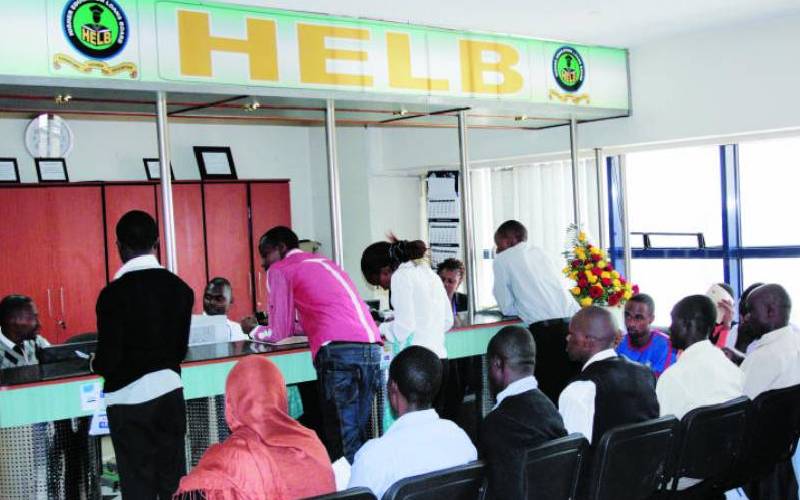Sh2.2bn funds shortfall, delays hit Helb as new academic year starts

The Higher Education Loans Board (HELB) is facing a funding crisis and is yet to receive its allocation, despite the start of a new academic year.
The chief executive officer of HELB, Charles Ringera (right), said there is a huge funding deficit that rolls over and affects future years.
As at yesterday, Ringera said, at least 110,000 students had applied for funding yet HELB had a budget for about 60,000. “We have not received any exchequer. That is why you can hear noise from students,” he said.
Ringera made the remarks during the first international annual conference for public universities in Mombasa. He said there were huge funding gaps for both continuing and first time students, adding that the board was planning to fund 660,227 first-time students joining universities and Tvet institutions, out of 143,000 placed by the Kenya Universities and Colleges Placement Service (Kuccps).
“We had planned for the 60,000 students at Sh2.6 billion. So how do you fit the 60,000 to the 110,000 who have already applied. For the entire 110,000 students, we require Sh4.8 billion,” said Ringera.
He said the budget that has been approved by the board so far is Sh2.6 billion, meaning there is a shortfall of Sh2.2 billion for first-time applicants.
For continuing students, HELB had planned to award loans to 168,373 students at a cost of Sh7.3 billion.
Ringera, however, said that as at yesterday, there were 198,000 applications, which are expected to rise because the application window will close at the end of this month. “We require Sh8.6 billion to give them the Sh43,200 average against a budget of Sh7.3 billion, which means there is a budget gap of Sh1.3 billion,” he said.
In total, Ringera said that universities and Tvets have a funding deficit of Sh3.5 billion and Sh1.5 billion — about Sh5 billion cumulatively.
Since inception over 20 years ago, HELB has supported over 1.3 million students at a cost of Sh131 billion. Out of those, there are about 546,000 students in Tvets and universities.
About 10,000 students have not made any attempt to repay their loans, dating back to the start of the board, which is worth Sh10 billion, he said. The recent waiver on penalties, owing to the Covid-19 pandemic, saw a collection of Sh550 million last year, the highest recovery level for Helb, which hit Sh5.2 billion, said Ringera.
As the second quarter sets in, Ringera said that HELB has not even received for the first quarter.
“We had smoothened this arrangement with Treasury and agreed that rather than quarter capitation, they will be giving us half capitation. This is because of synchronization between exchequer released by Treasury and the way the academic calendar looks like is completely opposite,” he explained.
“Despite being underfunding, even the underfunding is delayed to come so you can see the double jeopardy we are looking at,” he added.
Since inception over 20 years ago, HELB has supported over 1.3 million students at a cost of Sh131 billion.
Out of those, he said there are about 546,000 students in TVETs and universities. “We have 238,000 students who have completed repaying their loans to the tune of about Sh26 billion. Currently, about Sh48 billion is being serviced by about 286,000 students,” he added.
He however, said that the board has challenge with regards to about 10,000 students who have not made an attempt to repay their loans back, dating back to the start of the board, which is worth Sh10 billion.
According to Ringera, the recent Covid-19 pandemic waiver on penalties incurred saw a collection of Sh550 million last year, thus recording the highest recovery level for HELB, which hit Sh5.2 billion.
“When I joined HELB in 2013, I found a collection rate of about Sh2.7billion a year so having hit Sh5.2 billion then that was a record collection,” he said.
The record collection, however, has come as a challenge for HELB in terms of budgeting because when more is collected, the exchequer reduces while the students are increasing.
For the two years with the Covid-19 pandemic, he said the 2019/202 saw them lose Sh2.8 billion and one quarter was not delivered while in 2020/2021, there was another adjustments of Sh2.2 billion downwards.
“This means that during the two Covid-19 period year, we have lost Sh5 billion and is now rolling into future years,” he said.
On loan collections, a number of people lost their jobs, which he said saw HELB fell short of its Appropriation in Aid by about Sh1 billion and in total during the Covid-19 period they lost about Sh6 billion.
Last year, HELB funded about 347,166 both in Tvets and universities at a cost of Sh14.8 billion. Of this, Tvet was 106,048 and carried Sh3.9 billion.
“Even with the stellar performance last year where we put in about Sh550 million for waiver campaign, we still had 35,137 students worth Sh1.4 billion that went with a funding level of zero…we give them zero so that next year they do not have to reapply again,” he explained.














